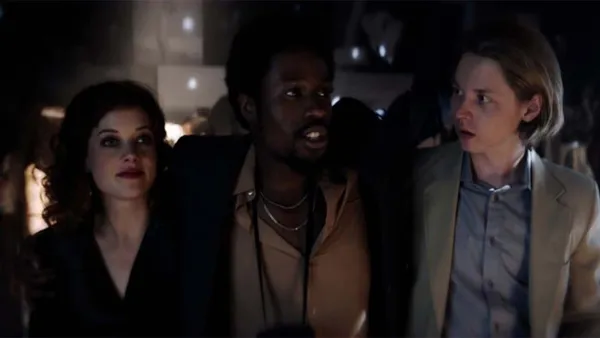Eye For Film >> Movies >> Pretenders (2018) Film Review
Pretenders
Reviewed by: Jennie Kermode

One of the first things one needs to understand in order to do a competent job as a film critic is the difference between looking at a film and looking at looking at a film. There's certainly artistic value in the latter - a lot of what mattered about the French New Wave was the way it distilled down key cinematic tropes and invited the industry to take a look at itself - but mistaking the meta narrative for the real thing can only lead to heartache, like mistaking a woman's beauty for the beauty of being loved by a woman.
All women are objects to Terry (Jack Kilmer). He talks about a high school sweetheart but not very believably. He's sweet and self-effacing, the kind of individual whom an inexperienced woman might mistake for a nice guy, but he's in love with the celluloid form of Anna Karina in Une Femme Est Une Femme and quite unprepared for a woman with more than two dimensions. When he meets Catherine (Jane Levy) at a screening of that film he's instantly smitten, but needs the support of photographer Phil (Shameik Moore) to make a move on her. The budding romance is then interrupted when Phil decides he wants her for himself. As she moves back and forth between the two of them over the course of the next ten years it becomes clear that she's not getting everything she wants from either one, and the increasing understanding between them is paralleled by their growing awareness that they don't understand her at all.

The Pretenders is built almost entirely out of pieces of New Wave films which are so densely packed in that it would insult the intelligence of the viewer to begin identifying them. Whilst some are woven into the narrative in such a way as to invite a warm smile of recognition, others may as well be driven into the viewer's skull with a sledgehammer and some are hard to classify as anything but plagiarism. Nevertheless, there's a fair amount here to admire, from Peter Zeitlinger's genre-bending cinematography to Moore and Levy's performances and a show-stealing turn by Juno Temple in the latter half, which delivers the film's only real emotionally affecting moments. There's an intelligence to Moore's work which suggests his character is himself performing a role designed to impress rather than being himself. Levy and Temple, meanwhile, have only their acting skills, rather than their actual lines, with which to assert that they are more than motivational devices for the men or, worse, New Wave-style beautiful muses for the director.
The film's principal weakness is that it's so busy being clever at being something else that it forgets to be itself, and despite the good performances it constantly keeps the viewer at a distance. Kilmer (the son of Val Kilmer, though a different casualty of Hollywood excess (and better actor), Dennis Quaid, is wheeled out to play his father here) captures the distance of the New Wave hero too well to engage and can't pull off the world-weary hero schtick convincingly because he looks about 15 throughout. There's a nice little turn from Brian Cox near the end which hints at what might have been possible with a more measured approach. Franco himself makes a appearance, of course, as a successful filmmaker who's just a little too sure of himself (the year after this was filmed, Franco found his own reputation falling fast after the internet saw the sleazy way he hit on a teenager).
As a film about the way that many young male cinephiles and photographers see women, The Pretenders has some worthwhile points to make, but none of them are new and it's not clear that Franco himself has taken them in. Whenever the pace of events slows down, more scantily clad women are draped around the screen to make sure we don't stop paying attention, and rarely do they get anything to say. In one excruciating moment, an actress swoons over a film critic because he said something nice about her work. One cannot help but shudder at thought of what this might inspire in some critics were it possible to take it seriously.
There's a core theme here about actors as individuals who like to play different roles, to become different people, as Catherine does with her lovers. Scenes in which a woman in a white fur coat and broad-brimmed hat seduces our heroes behind a cinema screening Last Tango In Paris - shot at a point when Maria Schneider had already spoken out about Bertolucci's treatment of her on set but before it had become part of the wider dialogue about abuse - inadvertently highlight the tragedy of this way of thinking.
Temple's character aside, the women remain mysterious, unknowable. One final Talented Mr Ripley shot in a mirror is not enough to give Catherine her due. Josh Boone's script uses women's experiences in the same cheesy way as his directorial hit The Fault In Our Stars. Terry gets to play the role of the tragic hero. An inexperienced viewer might mistake him for a nice guy. The camera keeps rolling. The Pretenders is clever and cleverly performed, often visually alluring, observant, stylish and shallow.
Reviewed on: 29 Sep 2019

















